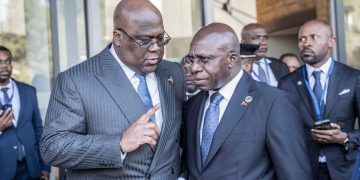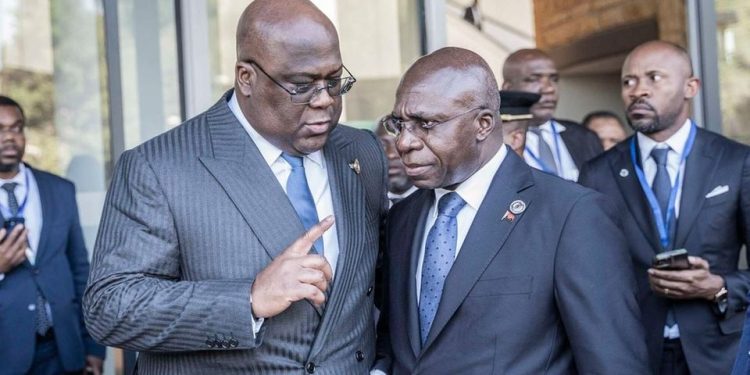President Felix Tshisekedi went to the African Union Summit seeking censure of the M23 rebel group and its supporters for fomenting insecurity in eastern Democratic Republic of Congo.
Kinshasa has been lobbying for a stronger decision by the African Union to have the M23 rebels and their backers reprimanded, while also insisting that the full deployment of the East African Community Regional Force (EACRF) prioritise combat in the rebel-held areas.
Sources told The EastAfrican that DRC wants any full deployment to mean combat against armed groups attacking government forces in the restive region.
It also wanted the continental body to reprimand Rwanda for its alleged role in fuelling the conflict, a rare thing at the African Union, which prefers dialogue on the issue.
‘Unjust and barbaric war’
Last week, President Tshisekedi visited Comoros, where he spoke with President Azali Assoumani, the incoming AU chair, “about my country and this unjust and barbaric war imposed on us by Rwanda.”
“My hope is that my elder brother here will help to bring peace,” the Congolese leader said in Moroni.
Sitting to discuss the DRC conflict, however, the African Union Peace and Security Council in Addis Ababa on Friday endorsed decisions of the East African Community to have adequate deployment in the east.
On Friday President Tshisekedi tabled the agenda on M23’s disobedience of regional leaders on ceasefire before a AUPSC meeting in Addis.
“The evaluation of the operations in the east of the DRC, the refusal of the M23 to withdraw from the Congolese territories which it occupies illegally, in spite of the resolutions of Luanda and Bujumbura, are some points which will be evoked during this Summit,” his office said after the meeting.
Rwanda’s Paul Kagame, Angola’ João Lourenço, Burundi’s Évariste Ndayishimiye, Samia Suluhu of Tanzania, Kenya’s William Ruto, Ugandan Vice-President Jessica Alupo and Deng Dau, Deputy Minister of Foreign Affairs for South Sudan attended the meeting. Also present was African Union Commissioner for Political Affairs, Peace and Security Bankole Adeoye.
Continued dialogue
President Ruto endorsed continued dialogue in search for peace in Congo, saying each of the neighbouring countries will lose if the conflict continues.
“Without these bold steps, our region will not be able to ride out the negative effects,” he said.
Last week, Defence chiefs of troop-contributing countries agreed to “immediately” deploy their forces to buffer violence and segment their areas of jurisdiction, even as the mission still eyes military diplomacy.
The AU, as is tradition, steered clear of blaming a member state as Kinshasa had demanded. Instead, the continental body called for de-escalation of violence and for Rwanda and the DRC to resume dialogue.
DRC conflict
The Council was discussing the DRC conflict for the first time since August 2022.
The meeting came as tensions between Rwanda and the DRC rose a notch higher over the alleged sponsorship of rebels. On Thursday, Kigali claimed that Congolese soldiers fired at Rwandan officials at a border post in Rusizi District and when Rwandan military responded, the Congolese withdrew. There were no casualties, according to a statement from Kigali.
EACRF are deployed under the Status of Forces Agreement (SOFA), which Kinshasa says must be complied with.
The priority for combat seems targeted at the M23, so far the strongest armed group in the DRC, for which Kinshasa blames Kigali.
Full deployment
Kinshasa wouldn’t clearly oppose the deployment. But Christophe Lutundula, the Congolese Deputy Prime Minister in charge of Foreign Affairs, said Kinshasa was yet to be fully won over on full deployment, given the grey areas it wants addressed.
“We are following this with great attention. Anything that is not in the sense of allowing the Republic to fully exercise its sovereignty, to safeguard its territorial authority, to safeguard the independence of our country, we will not accept, that’s for sure,” he said on Tuesday.
“We will further look into this decision to decipher the content. It is not just the writing, but the spirit of what has been proposed. We are following that very carefully.”
“We will evaluate the SOFA without complacency. I can say that we will not hesitate to put an end to it. But we don’t want to,” said the Congolese Foreign Minister.
“We are not working in this perspective, our perspective is to requalify and reboost the SOFA.”
‘Passive’ regional force
The comments came as some sections of the public began protesting at what they called a “passive” regional force deployed last November, but which has yet to fire a shot.
So far, only Kenyan troops are deployed around Goma, North Kivu, from where they have been positioned to buffer the city. Violence between the DRC army, FARDC, and M23, however, has gone on.
The EastAfrican understands the EACRF has adopted a new posture in the wake of civilian pressure to enter combat in Eastern DRC. One such arrangement is to set out new boundaries that will see each of the participating troop-contributing countries accorded distinct locations to extend a buffer zone against civilian invasion by the armed groups.
Additionally, M23’s withdrawal timelines have been extended by a month.
In its lobbying, however, Kinshasa has pushed for clearer timelines, including tougher deadlines for surrender by armed groups as well as granting the Congolese forces leeway to be directly in charge of territories surrendered by the rebels. At the moment, EACRF forces have been taking over those territories.
Timelines not honoured
Those timelines had been fixed before but not honoured.
According to a general agreement by EACRF defence chiefs last week, Phase One –running between February 28 and March 10 – should see M23 withdraw from Kibumba, Rumagambo, Karenga, Kiroliwe and Kitchanga.
Phase Two, running between March 13 and March 20, will see a withdrawal from Kishishe, Bambo, Kazaroho, Tongo and Mabenga. The final phase, starting on March 23, is dedicated to withdrawal from Rutshuru and Kiwanja.
Nairobi Process
The withdrawal will be followed by the regional force taking over the protection of civilians in the areas vacated by M23, after which dialogue will follow, with the Nairobi Peace Process expected to resume sometime in March for its fourth round involving representatives of communities in eastern DRC.
With the new boundaries, the Kenyan forces will be deployed in Kibumba, Rumaghabo, Tongo, Kishishe and Bwiza. They are also supposed to join the South Sudan forces at the Rumaghabo temporary operating base.
Ugandan forces will take charge of Bunagana, Kiwanja and Mabega as Burundi forces take control of Kitchanga and Sake.
Mistrust
However, neither Ugandan nor South Sudanese forces have arrived in Congolese territory yet, owing to mistrust expressed by some politicians in Kinshasa.
In keeping with the EAC Heads of State directive that dialogue and political process be accorded priority, the EAC defence chiefs reiterated calls for immediate and unconditional cessation of hostilities to seek political solutions.
Violations are to be reported to the Chair of the Summit – Burundi President Evariste Ndayishimiye – for action.
Regional Oversight Mechanism
President Ndayishimiye last week took over the role of the Regional Oversight Mechanism (ROM), a 10-year arrangement by countries in the Great Lakes Region, to deal with conflict. Until last week, Kinshasa was chairing the ROM, an organ that reviews regional commitments to peace under the AU Peace and Security Council.
Some analysts have noted that the African Union has been less involved in the Congo, choosing to work behind other international initiatives.
“The question is what the body might do concretely,” said a bulletin by the International Crisis Group (ICG) ahead of the AU Summit this week. “AU involvement in military matters is unlikely: whatever problems it may be facing, the EAC set up the force that is working at present to stabilise the eastern DRC.”
“The AU could usefully put to work its convening power to improve coordination among the various diplomatic initiatives aimed at defusing tensions in the east.
“Unless the number of initiatives decreases, which seems desirable but unlikely (as powerful states belong to different groupings), the AU could try to ensure that the different efforts are synced up and consistent in their aims,” the ICG added.
In the DRC conflict, three separate but related initiatives have all been backed by the African Union.











